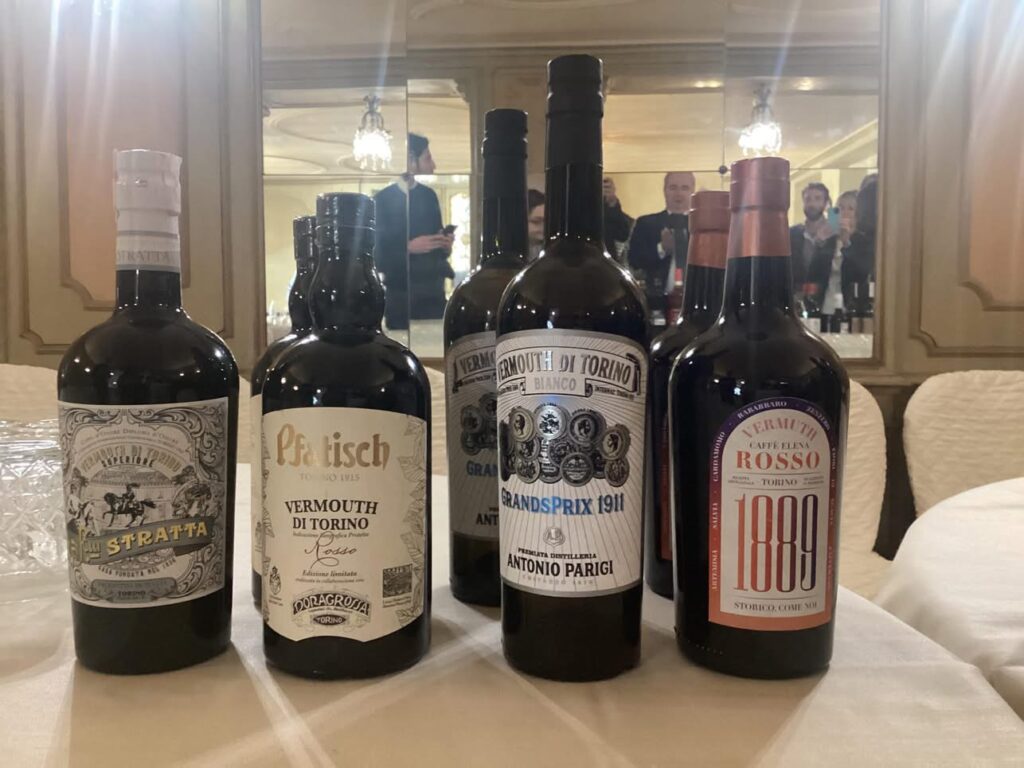The dream coming true of a European Route Bridging Turin, Chambéry, and Reus
On April 4th, 2025, within the elegant setting of Caffè Torino in Piazza San Carlo, the conference “Stories, Routes, and Cultures of Vermouth” officially marked the beginning of a new chapter for Iter Vitis – Cultural Route of the Council of Europe. The event was organized by the Association of Historic Cafés of Turin and Piedmont as part of the fourth edition of “Vèrmut! Il Festival dei Vermouth”—a festival dedicated to celebrating the rich tradition of vermouth through sensory experiences, thematic itineraries, and storytelling.
This year’s edition of the festival offered more than a tasting experience: it brought together international voices from France, Spain, and Italy in a roundtable that underscored vermouth’s deep cultural significance and its power to connect territories.
Turin: The Cradle of Vermouth
It was in Turin, in 1786, that Antonio Benedetto Carpano created the first modern vermouth. Since then, the drink has grown into an international icon of refinement and conviviality, thanks in no small part to the city’s historic cafés—spaces of elegance, intellectual exchange, and social transformation. From Caffè Mulassano to Caffè Elena, Pfatisch, and Stratta, these establishments have served and celebrated vermouth for over two centuries, and many even produce their own house label.
As Edoardo Cavagnino, President of the Association of Historic Cafés of Turin and Piedmont, reminded the audience:
“Historic cafés and vermouth have been intertwined for nearly 240 years. More than places of consumption, these cafés have always been meeting grounds—cultural and political crossroads where the culture of vermouth has been nurtured and passed on.”
A Transnational Vision: The European Vermouth Route
The highlight of the event was the announcement made by Emanuela Panke, President of Iter Vitis, who formally welcomed all 22 cafés of the Association as certified Iter Vitis destinations. This strategic step lays the foundation for the European Vermouth Route, an international initiative to trace the cultural, botanical, and social journey of vermouth from its origins to its modern revival.
The proposed route connects three emblematic cities:
• Turin (Italy) – Birthplace of vermouth, where historic cafés became the stage for this iconic aperitif’s rise.
• Chambéry (France) – Nestled in Savoie, this Alpine city gave vermouth its own aromatic identity, defined by fresh mountain herbs and the creation of white vermouth. As Pierre-Olivier Rousseaux, President of Maison Dolin, noted:
“Dolin has proudly carried the tradition of Savoie vermouth since 1821. With Turin, we share not only a product but a common history, once united under the Kingdom of Piedmont-Sardinia.”
• Reus (Spain) – The Catalan capital of vermouth, where the ritual of fer el vermut lives on in a vibrant, urban culture of bars, festivals, and the Museu del Vermut. As Noemí Llauradó, Councillor for City Promotion of Reus, affirmed:
“Reus has made vermouth its identity. Bringing our tradition to Turin—the birthplace of it all—is both an honor and a responsibility.”
Together, these cities form a cultural triangle that embodies the shared heritage and diversity of vermouth in Europe.
Culture, Tourism, and Sustainability
The European Vermouth Route is not simply a celebration of a beverage. It is a comprehensive cultural project that brings together territory, tradition, and storytelling. Through this initiative, Iter Vitis aims to:
• Protect and promote vermouth as part of Europe’s intangible cultural heritage
• Develop immersive, sustainable, and narrative-based tourism experiences
• Foster international cooperation between local producers, institutions, and cultural networks
This route will weave through vineyards and urban cafés, distilleries and botanical gardens, offering visitors not only flavors, but meaningful connections with places and people.
As Emanuela Panke stated:
“Promoting vermouth as a cultural ambassador means valuing a heritage that blends knowledge, territory, and tradition. With the collaboration of France and Spain, the European Vermouth Route becomes a powerful symbol of our common identity and our commitment to building a sustainable, inclusive, and intercultural Europe.”
A Toast to the Future
The creation of the European Vermouth Route represents a significant evolution in the Iter Vitis network, which now spans 25 countries from the Caucasus to Western Europe. It offers a model for how food and wine heritage can serve not only as a gateway to the past but also as a catalyst for economic development, community pride, and intercultural dialogue.
With vermouth, Iter Vitis opens a new and flavorful chapter—one that invites the world to discover the places, people, and passions behind every glass.
To learn more about the Historic Cafés of Turin and Piedmont, visit: www.caffestorici.eu
For information about the Vermouth Festival: www.vermutfestival.it

